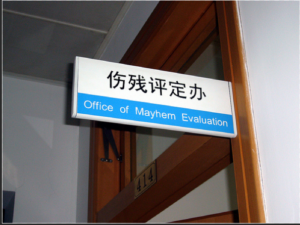Don’t let translation mayhem lead to Enron results

If you’ve seen Lucy Prebble’s excellent ENRON, you have some idea of how clever fraudsters were able to fool and ultimately bring down accounting giant Arthur Andersen and led to a $30 million payout by its law firm, Vinson & Elkins. In today’s globalized world, and with the rise of China’s economy, a new player is driving fraud and malpractice: the humble, anonymous Chinese translator. The average Chinese translator now mirrors the role that lawyers played in the Enron drama: they are largely in the dark about the purpose and nature of the translations they are providing; yet their work is routinely combined into a scheme of fraudulent misrepresentations. By relying on the false and fraudulent work of dishonest or incompetent Chinese translators, these lawyers, in turn, make false representations and render incorrect judgment.
The connection between Chinglish and Enron-level fraud has not gone unnoticed; David Hwang’s celebrated play Chinglish is about a disgraced ex-Enron executive’s attempt to rehabilitate his career by persuading China to replace misleading Chinglish signs with truthfully translated ones.
I now turn to a true story of executives and general counsel whose blind reliance on unqualified
Chinese translators led to such troubles.
Chinese translators led to such troubles.
I audited the work of two translation companies involving very similar white-collar crime cases. Both corporate defendants had initiated very similar internal investigations when alerted to a problem. The company that hired the ethical translation company got things right and earned the sympathy of federal regulators received lenient treatment. Their United States and China offices communicated clearly, uncovered the truth, and reported it to regulators and other stakeholders in a timely, prompt, and clear fashion. Their liability was reduced, and they were forgiven. I helped audit their work because they wanted it done right before the law; the other firm’s translations were audited by me at the behest of the company that ultimately claimed fraud.
A criminal indictment has the following to say about the one that hired a big outsourcer, a top 3 company: wrote an “investigation report authored by its Chief Legal Counsel for Labor and Employment […] purporting to summarize the findings of an internal investigation into the above-described misconduct” –the ones relying on the translations by the big outsourcer— “affirmatively mislead” the victim and “cover up” of what prosecutors called “very serious allegations of illegal behavior.” The criminal indictment goes on to say that in a parallel civil litigation, the corporation, its executives, and its General Counsel, “attempted to corruptly obstruct, influence, and impede an official proceeding.”
Despite facing very similar facts, one company earned stakeholders’ trust while the other became increasingly painted as a menace. What truly perplexes me is that the corporation’s internal translation department, but it was the American attorneys who turned to incompetent translation services that led themselves far astray and brought down the fire and fury of the federal government upon their client. They trusted sales pitches and over-promising managers, or misleading rankings about the biggest translation companies, bringing the temple down on their own heads.
As a lawyer, if you hire incompetent translators and rely on that information, then you are the one responsible for those mistakes and you are the one that will be held responsible. If you hire an unqualified translator and rely on their flawed work product, then there is only one person to blame for negligence reliance. This can have serious consequences: take, for example, Fonterra Foods, whose flawed Chinese language and cultural engagement led it to make a huge due diligence oversights in China that put poison in infant formula, hospitalizing a confirmed 50,000 infants. Noteworthy China watcher James McGregor told US News & World Report of the disaster, “What this proves is that you can’t be clueless in China.” And to avoid being clueless about China, you need mission-critical information in Chinese rendered into accurate English by an expert.
Numerous translators and even translation companies in China have asked me to help educate the general public about the problems of Chinese translation that so often cause it to devolve into a kind of scam. China itself is a victim of these frauds, with its image often unfairly tarnished in the media due to simple misunderstandings, or as the butt of Chinglish jokes. As a licensed attorney that specializes in Chinese legal translation, I have insights about how to manage and avoid these risks so that your venture in China can be a success. I’ll be sharing more of these insights over the next couple of weeks for the benefit of the business law community.


1 comment
OMG these kinds of professional writings always remind me that my English is a mess! I can’t understand most of what you said in the middle part!